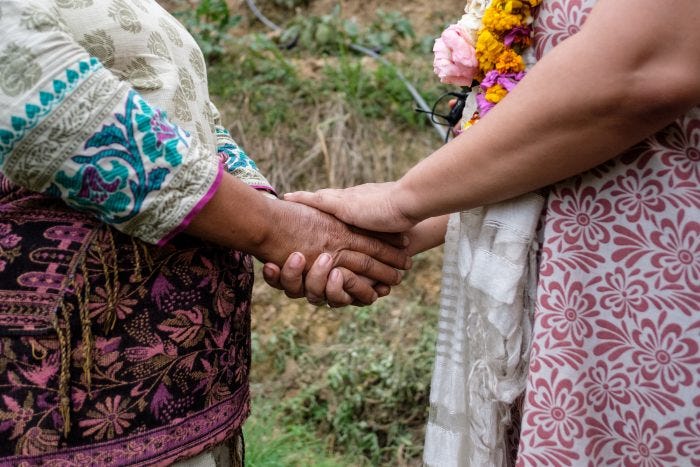Widening the Web of Connection
Vibrant Communities Practice Solidarity
In times of division and great uncertainty, it can be tempting to retreat to a defensive stance where we resist diverse views out of fear and desire to protect ourselves. Rather than retreating into insularity, we can most effectively meet the moment from a place of solidarity, welcoming ever more people into our circles of regard.
The longing to belong is neither healthy or unhealthy, though the ways in which we fulfill that desire have significant consequences for our personal and collective well-being. As more people practice solidarity and pay attention to our common humanity rather than our divisions, the entire paradigm of “how things are” shifts.
By creating and nurturing vibrant communities, we can experience healthy belonging. In these places, we thrive because they encourage our individuality and authenticity, while prioritizing sharing and working toward the common good.
For two years, I traveled the country and met with communities that fostered a sense of healthy belonging (more on that can be read here.) Vibrant communities place relationship first and promote solidarity, not only towards their members, but also towards those who lie outside their immediate community. They practice a form of care that honors our differences while recognizing our common humanity.
Solidarity is cultivated when we recognize that interdependence is our natural state. The belief in the ties that bind us together strengthens our sense of belonging more than aligning against others ever has. The more we can discover and honor the differences within our own communities, the more we can extend that acceptance outside the boundaries of our personal communities. When we extend a welcome beyond our communities, in a sense, creating meta-communities of care, we strengthen our own sense of solidarity.
A vibrant community twenty years ago looked different to how it looks today, and today looks different from how it will look twenty years from now. We must focus on where we are heading, which requires reconciling the past.
In our communities, we are called to meet the challenges of this moment in history. This begins by healing the rifts between us, co-creating language that builds connection, and joining with each other despite our differences.
Foundational change takes a long time and can only happen when we, together, take ongoing meaningful action in the right direction. A fundamental shift in perception, how we hold power, and what we view as most important, is inevitably gradual and at times disruptive.
Focusing on our common humanity does not preclude the need to challenge stagnation and actions that take us backward. (This is particularly urgent as rights are being rolled back and politicians are trying to deepen divides through exaggerated characterizations of our differences, bordering on the absurd.) Still, what’s most important for paradigmatic change is that we bear the disruption with solidarity, identifying and sharing stories in the direction of growth, and viewing ourselves as participants in the creation of powerful new stories.
Over five decades ago, in his Nobel Peace Prize acceptance speech, Martin Luther King Jr. described the dynamic juncture that we still find ourselves in today. Let us further the paradigmatic shift he foresaw: A freedom movement spreading towards wider liberation, nurtured by the spirit of vibrant community:
In spite of the tensions and uncertainties of this period, something meaningful is taking place. Old systems of exploitation and oppression are passing away, and out of the womb of a frail world, new systems of justice and equality are being born. … Here and there, an individual or group dares to love, and rises to the majestic heights of moral maturity. So, in a sense, this is a great time to be alive.
Practice
A helpful antidote to feeling overwhelmed by the divisiveness and injustice around us is to imagine solidarity. If you meditate, pray, or visualize – include a minute of breathing and imagining solidarity. What does it look like for you? Make it as vivid as you can – where are you, who is there, what are you doing? With time, you can include the practice of welcoming people who have been outside your awareness or on your margins into your vision of solidarity.
I imagine a motley group of people, different along every dimension possible, holding hands along a huge expanse. We are singing and laughing. Sometimes, in this vision, a woman's powerful voice rises above the others as she belts out Sam Cooke's "A Change is Gonna Come". There are people in this vision who I want in my community, and sometimes (on an expansive day), I have the space to include a person that’s typically difficult to add into my circle of regard.
This kind of imagining doesn’t have to take more than a minute or two. When practiced regularly as a ritual, it encourages a feeling of connection and belonging.
Maya Angelou’s poem, “A Brave and Startling Truth”, was composed in 1995 for the 50th anniversary of the United Nations. Angelou dedicated this poem to every living being on the planet, and to “the hope for peace, which lies, sometimes hidden, in every heart.”
The recording below is Angelou reading this beautiful poem at the United Nations.





